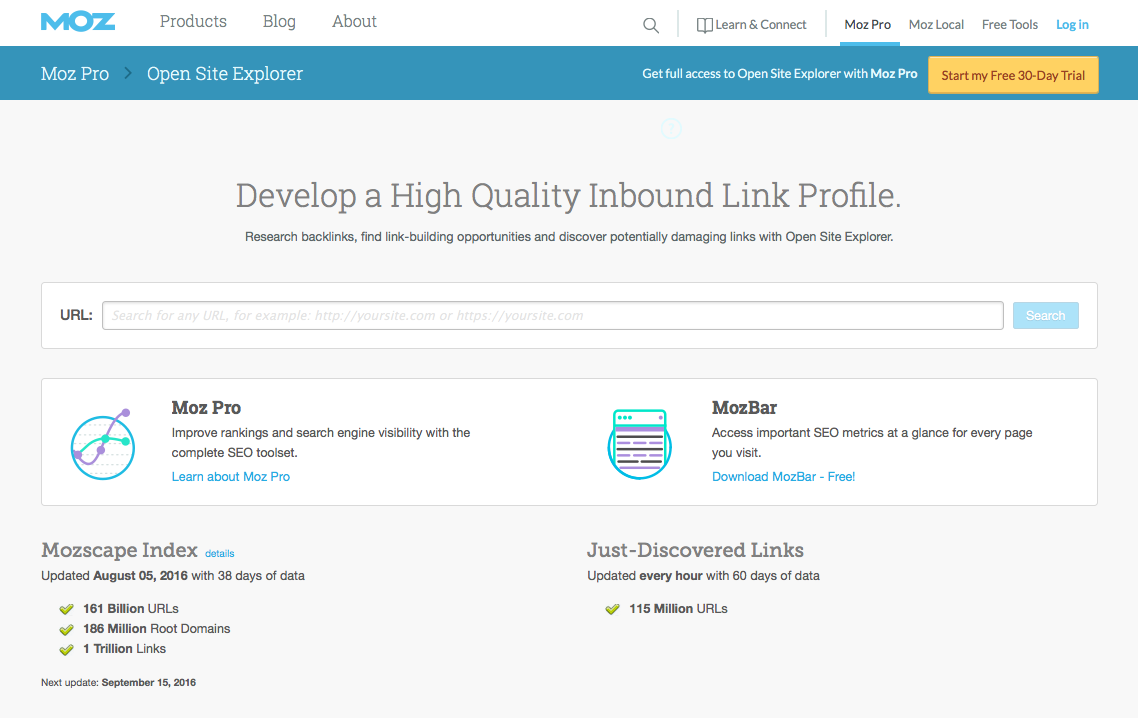Inbound links are still one of the most important and influential ranking factors for organic search. In fact, according to Moz’s most recent Search Engine Ranking Factors Report, domain- and page-level link features are the top two most influential factors.
Source: https://moz.com/search-ranking-factors
Obtaining links, quality links, isn’t always easy though. It requires an intentional effort, and takes time and resources to get the best links. For ecommerce businesses, there are some ways to go about obtaining links in more efficiently and effectively. Below are 11 of those ways.
1. See What’s Out There Already
If your brand or product is mentioned on a site, but no link is included, inquire if they will provide one. You may not always get it, but it never hurts to ask. You can simply Google your brand or product names, or use a social listening tool like SocialMention to find these opportunities.
2. Scope The Competition
Use Open Site Explorer to learn who is linking to your competitors. It’s likely you’ll find some sites that make sense to link to you as well.
3. Product Reviews
Send free product to bloggers or influencers in exchange for a review, and ask that they include a link within the review. Just make sure to remind the bloggers that they must include a disclosure about receiving free product in the review. Read our blog “How to Adhere to New FTC Guidelines for Social Media” to learn more.
4. Philanthropy
Do good for the sake of doing good and to support worthy causes, not just to get links. But if your business is already giving time or money to a charity or cause, go ahead and ask for a link.
5. Associations
Is your business is a member of any industry associations or organizations? If so, you can likely get a link from their site. It may be something you can add yourself through a member profile, or you may need to simply ask your contact at the organization to add it.
6. Sales/Promotions Page
Create a single page where any and all sales or promotions are listed (e.g., www.mysite.com/sales). Keep this page live and updated as sales come and go. This can be used to share with bloggers or influencers ongoing when you’re promoting specific sales, and can build up a good deal of authority overtime.
7. Testimonials For Other Businesses
Do you use any services or products for your business that you love? If so, write a testimonial that can be posted on that business’s site. Most businesses will jump at the chance to add more glowing praises to their site, and will be happy to include a link along with it.
8. Manufacturers
Oftentimes manufacturers will have a page or section with a list of online retailers that carry their products. Simply reach out to your manufacturer(s) and ask if they’ll give you a link.
9. Partners
Who else do you do business with? Maybe it’s a vendor or dealer. Maybe it’s a complementary product. They almost definitely have a website, and might be willing to add a link to your site. All you have to do is ask.
10. Interview Industry Authorities
Does your industry have well-known experts or authorities? If so, consider interviewing them and posting a write up of the interview on your blog. Then share on your social media channels. The authority will likely do the same to promote themselves, and it can often lead to others picking up the interview and linking to it (or at least sharing it).
11. News Roundups
A simple way to develop original content without having to start from scratch is to create summaries of industry news and announcements on a frequent (e.g., weekly or monthly) basis. Again, share on your social media channels to expand reach or include in an email newsletter, and hopefully others will see the roundup and link to it or share it.
Sure, link development takes time and effort, but it’s an extremely important part of a comprehensive SEO strategy. Starting with these 11 simpler and legitimate tactics can get you started with some quality links for your ecommerce website.



